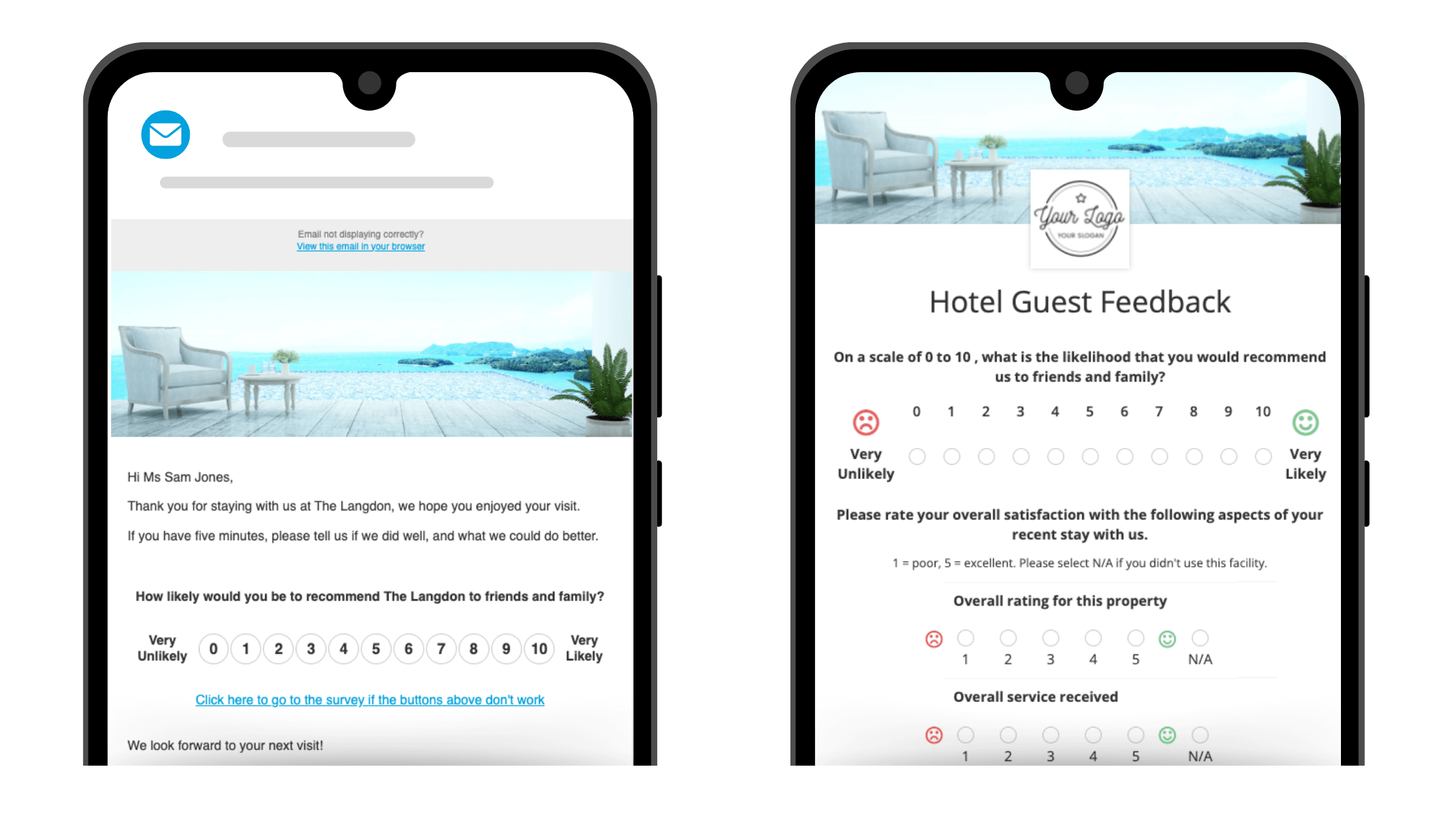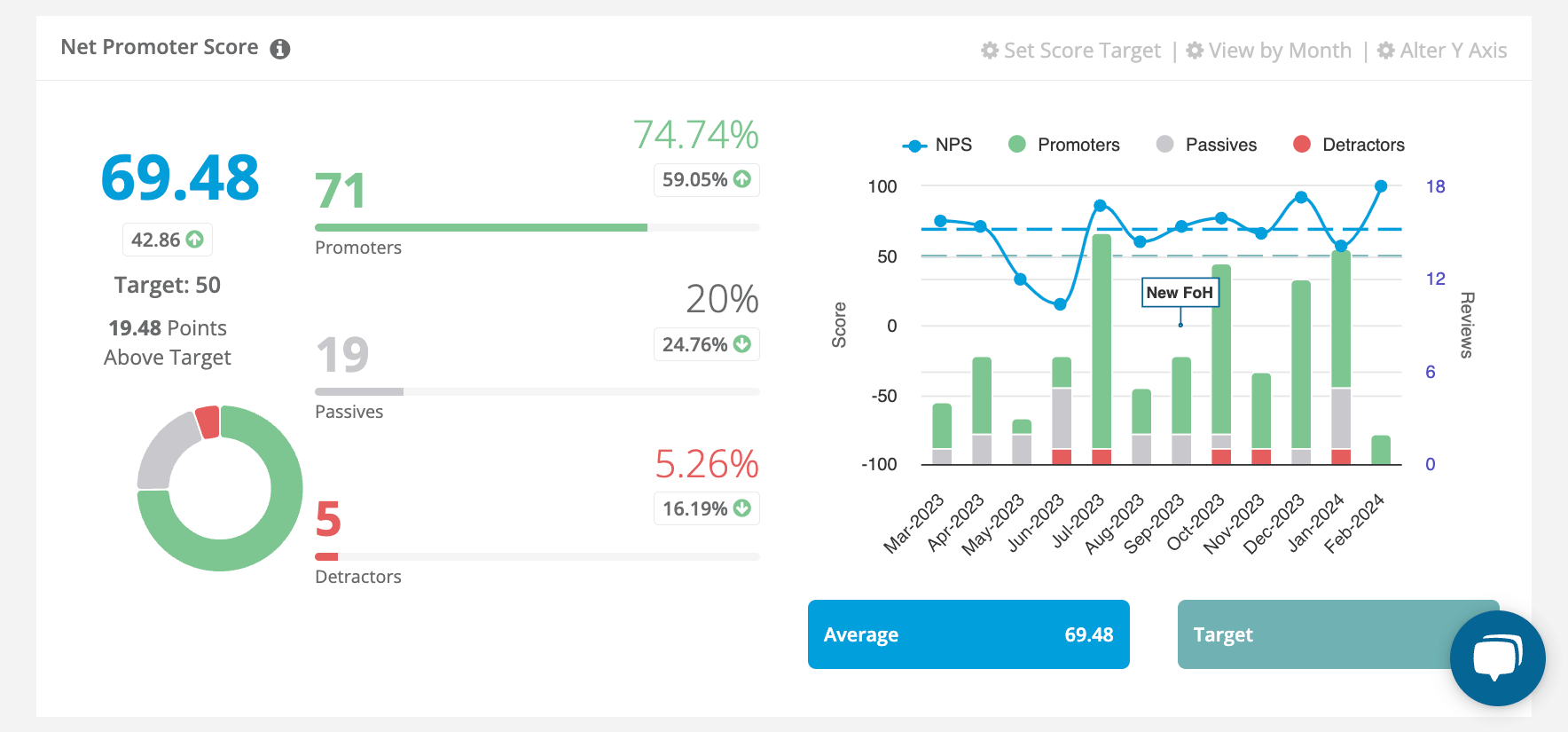
By Sarah Came | Head of Marketing at GuestRevu
As a hotelier, you’re in the business of providing great experiences for your guests. Whether that’s an amazing deal on a comfortable room for a business trip or a luxury escape where every whim is catered to.
If you do this successfully, you can rest assured that your guests will happily recommend your hotel to their friends, family, or colleagues, providing you with the most effective marketing any business can hope for.
In this article, we break down a key metric in guest satisfaction, NPS, and provide insight into how it can help you increase loyalty.
The Net Promoter Score (NPS), first developed in 2003 by Fred Reichheld, measures guests’ expressed willingness to recommend your hotel to their friends and family. By understanding how likely guests would or wouldn’t be to recommend your hotel to their loved ones, you understand how successful you are at delighting your guests or how frequently you’re not living up to your expectations. What is the NPS?
NPS calculation: Determining your score
Determining your Net Promoter Score starts by asking your guests a carefully constructed question designed to assess their loyalty to your brand. To be an accurate measure of your NPS, the question must follow the format: “How likely would you be to recommend [hotel] to friends or family?” and must be scored on a scale from 0 to 10.

The Net Promotor question is usually first on a GuestRevu survey, and can be included in the survey invite email to encourage even more responses to this crucial question
The most notable difference between the NPS and other rating questions on surveys in the hospitality industry is the inclusion of 0 as an option. Using 0 to indicate “worst” helps to limit ambiguity or misunderstandings (guests sometimes mistakenly interpret 1 as “best”), and it also gives guests sufficient options to express how they feel.
This does mean there are 11 options, and the score is not instantly recognizable as a percentage. The Net Promoter Score, however, is not a percentage – it’s a number between -100 and +100. To calculate this number, responses to the NPS question are sorted into three categories:
☹️ Detractors (0-6) – those who would dissuade others from visiting you
😐 Passives (7-8) – neither likely to recommend you nor speak poorly of you
🙂 Promoters (9-10) – will go out of their way to recommend you
The percentage of “detractors” is then subtracted from the percentage of “promotors,” and the resulting number is your hotel’s NPS.
NPS = % promoters – % detractors
For example, say a hotel received 100 responses:
- 20 detractors (0-6) → 20%
- 30 passives (7-8) → 30%
- 50 promoters → 50%
This hotel’s NPS score would be 30:
NPS = 50% – 20% = 30
It might seem a little harsh to have only two scores that indicate promotors and seven that indicate detractors (isn’t 6 still a passing grade?), but these segments are based on research into consumers’ real-world buying behavior, and unfortunately, a six just doesn’t cut it.
Bain & Company, which co-owns the NPS trademark, has found that more than 80% of referrals to a business come from people who scored a business 9 or 10, while those who gave a rating of 7 or 8 can have 50% lower referral rates.
What does the NPS score indicate about hotel guests?
Several other behavioral differences define the three groups and explain why the behaviors of promotors make them more valuable to your business:
How much they’re prepared to pay
Promoters aren’t as price-sensitive as other guests, as they see great value in the services your hotel provides, while detractors tend to think they’re getting a raw deal and will probably only come back if you offer them a discounted rate.
How likely they are to come back
Detractors tend to defect at much higher rates than promoters, which means a shorter, less profitable relationship with your hotel. This is particularly important for groups or hotels that depend on repeat guests or day visitors. Promoters have higher retention rates and resources should be spent reengaging them with marketing efforts.
How expensive they are to serve
Promoters stay for longer periods and encourage other guests to visit your hotel, both in-person and through online reviews. Detractors, however, tend to consume more service resources and often have complaints and demands for complimentary items and upgrades. They’re also more likely to leave a review about their negative experience, potentially costing your hotel future business.
How much non-room revenue they generate
Promoters often prefer to group their spending with one trusted supplier (ideally, you). If you’ve got a good NPS, offering additional amenities or add-ons will ensure your guests have an even better experience and help generate non-room revenue.
How good your reviews are
We all know how persuasive good product reviews are, and they’re even more important in the hotel industry, where prospective guests can’t get a free trial of a room or send it back if they aren’t happy. According to Tripadvisor research, almost 80% of travelers will use review ratings as a tiebreaker when deciding between two similar hotels.
What can you do with your NPS?
The likely economic value to your business from the different groups means that the NPS is frequently a reliable indicator of growth. More than that, it’s also a great benchmark for understanding and segmenting your guest feedback.
By observing which aspects of your hotel’s offering your detractors mention most often, you can identify where you may need to spend extra budget or engage in additional training. Conversely, your promotors will show you which parts of your property are leaving guests delighted and should be highlighted in your marketing materials and social media.

This hotel’s data shows an improvement in NPS following the new front desk hire
You can also track changes in your NPS over time to see the effect of facility upgrades or changes in staff or policies on customer satisfaction. You could also analyze the average NPS scores given by different guest segments to see if you’re meeting the needs of business travelers or if only families with children are having a good time.
If you’re looking for quick and easy social media content, filter your guest feedback so you’re only looking at comments from promotors. Sharing their comments (ideally with an appropriate image) is a great way to promote your hotel through one of the most trusted forms of marketing: social proof.
Your NPS provides invaluable insight into how your guests perceive your hotel and where your strengths and weaknesses lie. By actively using this data, you can pinpoint areas for improvement, showcase what you do best, and build customer loyalty.
When managed effectively, your NPS can serve as both a compass for internal growth and a powerful tool for external marketing, helping you ensure that more of your guests become enthusiastic promoters.
Whether you’re aiming to attract new guests, retain loyal visitors, or simply enhance the overall guest experience, monitoring and acting on your NPS is an essential step toward achieving your hospitality goals.
Thousands of hoteliers worldwide use GuestRevu to quickly and easily gather feedback from their guests and actively manage their online reputations. GuestRevu surveys and online review management tools are tailor-made for the hospitality industry, enabling hoteliers to gain a deeper, guest-focused understanding of operational strengths and weaknesses, monitor and manage their online reputation and reviews, and improve guest satisfaction. Reviews from our own delighted clients have helped GuestRevu win the HotelTechAward for Best Guest Feedback and Best Reputation Management Solution five times. A post by GuestRevu


















